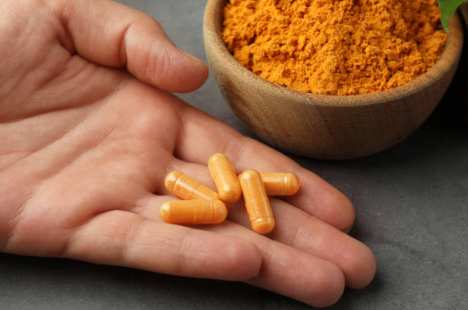Turmeric is a bright yellow spice derived from the Curcuma longa plant. A member of the ginger family, turmeric thrives in warm climates and is well-known for its active compound—curcumin—which is responsible for most of turmeric’s potential health benefits. It comes in several forms, including powdered spice, fresh root, and dietary supplements. It’s also a common ingredient in topical creams and skincare products.
1. May Help Prevent Skin Conditions
Turmeric is packed with antioxidants, which help reduce harmful free radicals in the body and protect cells from damage. Antioxidants are essential for maintaining healthy skin cells.
Exposure to environmental factors like UV rays and pollution increases free radical production. When free radicals build up, they can cause oxidative stress, which damages cells and can trigger conditions like hyperpigmentation or even skin cancer.
Eating antioxidant-rich foods like turmeric can help prevent this damage and protect your skin from long-term health risks.

2. May Help Manage Psoriasis
Psoriasis is a chronic inflammatory skin disorder that affects about 2–3% of the global population. It causes red, painful, scaly patches to appear on various parts of the body.
Because turmeric contains compounds with anti-inflammatory properties, it may be useful in treating inflammatory skin conditions like psoriasis—especially when used in the form of a topical mask.
Although lab and animal studies are promising, more research is needed in humans before turmeric can be officially recommended for psoriasis treatment.
3. May Reduce Sun Damage
Curcumin, the primary active ingredient in turmeric, has well-documented anti-inflammatory and antioxidant effects. Research suggests that topical curcumin may help reduce photoaging, which is skin aging caused by sun exposure.
In one study involving 28 people, participants who applied curcumin topically for four weeks experienced noticeable improvements in skin firmness and appearance.
4. May Reduce Acne and Cystic Breakouts
There’s evidence that turmeric has antibacterial properties that can help fight bacteria responsible for cystic acne and staph infections. While current findings are mostly from lab studies, more clinical trials on humans are needed to confirm turmeric’s effectiveness for acne and skin infections.
5. Can Act as a Natural Moisturizer
Turmeric may also help hydrate the skin. One study involving 47 participants found that drinking hot water infused with turmeric extract daily for eight weeks boosted hyaluronic acid production. Hyaluronic acid supports wound healing, reduces fine lines, and improves skin elasticity.
Participants in the study showed an increase in facial skin hydration, suggesting that turmeric extract may act as a natural moisturizing agent.
6. May Aid in Wound Healing
Roughly a billion people worldwide suffer from chronic or acute wounds. The first step in wound recovery is controlling inflammation.
Thanks to its strong anti-inflammatory properties, curcumin may help wounds heal faster and reduce the formation of scars. Early research supports turmeric’s role in speeding up wound healing.
7. May Help Reduce Atopic Dermatitis Around the Eyes
Adults often experience atopic dermatitis (eczema) around the eyes. In a study involving 360 people, a combination of turmeric extract, centella asiatica, and walnut extract helped reduce eczema-related symptoms such as flaking, itching, swelling, and redness.
How to Use Turmeric for Better Skin Health
Whether you want to try turmeric in a face mask or as a supplement, it’s a good idea to check with your healthcare provider or dermatologist first. They can let you know if turmeric might interfere with your current medications or skincare routine. Once cleared, you can choose between topical or oral turmeric for skin health.

Topical Use
You can buy skincare products that contain turmeric or make your own at home. Whichever option you choose, always perform a patch test before applying it to your entire face.
Apply the product to a small area—like the inside of your elbow—once a day for 7–10 days and watch for any reactions. If there’s no redness or itching, it’s likely safe for facial use.
If you notice irritation like redness, swelling, or itchiness, stop using the product immediately and rinse the area. Applying a cold compress or petroleum jelly can help soothe irritation. For more serious reactions, consult your healthcare provider.
Want to try a homemade turmeric acne remedy? Mix ½ teaspoon of turmeric powder with honey or coconut oil, apply it to blemishes for 10 minutes, then rinse with warm water.
Here’s a simple DIY turmeric face mask recipe:
-
Mix 1 tsp turmeric powder, 2 tbsp flour (all-purpose, chickpea, or finely ground oats), 2 tbsp plain yogurt or coconut oil, and 1 tsp honey.
-
Stir until you get a paste-like consistency. Add a splash of warm water if needed.
-
Gently apply the mask to your face.
-
Leave on for 10–15 minutes, then rinse off with warm water.
-
Pat your face dry with a clean towel.
Oral Use
Turmeric is generally safe to consume in foods and drinks. The U.S. FDA has approved curcumin as a food additive. Most experts consider it safe to take 4,000–8,000 mg of curcumin per day in supplement form.
Still, it’s important to consult your doctor before taking turmeric supplements—especially if you’re on medications for heart disease, cancer, or depression, as turmeric may interfere with their effectiveness.
Currently, there’s no conclusive evidence that turmeric is safe for pregnant or breastfeeding women, so it’s best to avoid high-dose supplements in these groups.
Risks and Precautions
Turmeric is typically safe when applied to the skin or taken as a supplement, but side effects and overdosing are still possible.
Even at moderate doses, turmeric may cause mild symptoms such as nausea, rash, diarrhea, headache, or stomach upset. If you’re new to turmeric, start with a small amount or split your daily dose to reduce the risk of digestive issues. Taking it with food can also help.
Always talk to your healthcare provider before starting turmeric—especially if you’re taking medications that turmeric could interfere with. Turmeric may reduce how well your body absorbs certain heart or cancer medications and may increase side effects when taken alongside antidepressants or allergy drugs.